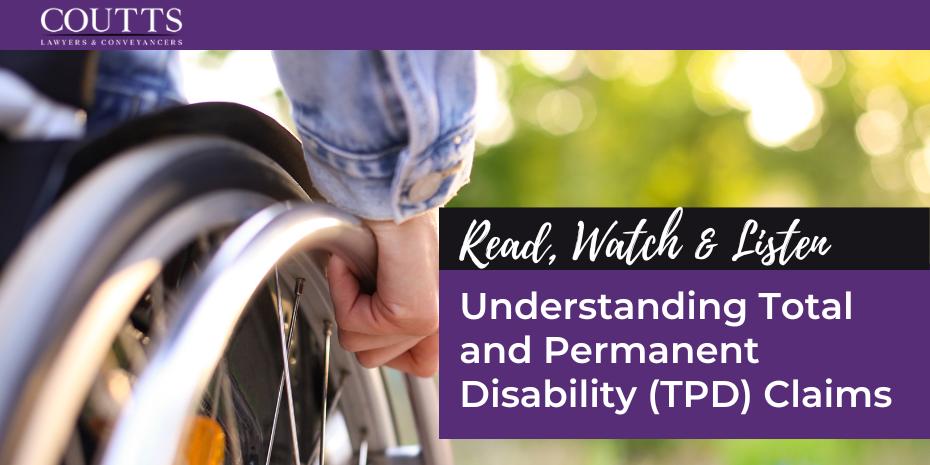KEY TAKE-OUTS
- The new CTP scheme, which came into force from 1 December 2017, contains benefits for drivers who were at fault and for drivers not at fault
- Statutory benefits include weekly wages, payment of medical and treatment expenses, and payment of domestic and personal care services
- Payment of statutory benefits beyond 26 weeks from the date of the motor accident depends on whether the injured person has suffered a minor or non-minor injury, and whether they were contributorily negligent
- There are strict time frames throughout the claims process, so it is important to seek legal advice early
The primary statute in New South Wales for motor vehicle accident claims is the Motor Accident Injuries Act 2017. This Act commenced on 1 December 2017 and introduced a new compulsory third party (CTP) scheme which provides statutory benefits for injured persons, regardless of fault or the severity of their injuries. In some claims, however, disputes may arise between a claimant and an insurer in relation to payment of statutory benefits, such as weekly payments or payment of medical expenses. If you have been injured in a motor vehicle accident, it is important to know what statutory benefits you can claim under the NSW CTP Scheme , and the strict timeframes and procedures that apply.
What benefits can be claimed under CTP? Up to 26 Weeks from the Date of Accident
A person injured in a motor vehicle accident will be entitled to receive the following statutory benefits for the first 26 weeks:
- Weekly income payments for loss of wages;
- Medical and treatment expenses; and
- Domestic and personal care services
In relation to medical and treatment expenses, the insurer will have regard to the following matters when determining whether to pay reasonable and necessary treatment and/or rehabilitation costs:
- The relationship of the service/treatment to the injury sustained because of the motor accident
- Whether the service/treatment is likely to assist the injured person in returning to their usual, pre-accident activities and improve their ability to function
- Whether the requested service/treatment is appropriate for the injury
- Whether the cost of the service/treatment is reasonable and in accordance with any relevant legislation or guidelines
- Whether the service/treatment will be provided by an appropriately qualified Health Practitioner
CTP Claims Process
You should provide your treating health practitioner with your insurer claim number. Your treating health practitioner will provide your claim number with any request, referral or plan submitted to the insurer.
Pre-Approval Process
The insurer will determine a request for treatment, rehabilitation, or care within 10 calendar days. Payment for pre-approved treatment will be provided and paid directly to the health practitioner and/or medical practice within 20 calendar days.
Re-imbursement
The insurer will reimburse any reasonable and necessary treatment, rehabilitation or care incurred, together with travelling expenses. It is important that you retain copies of any receipts or invoices for out-of-pocket medical costs to submit to the insurer. Payment after the fact is not guaranteed, however, so pre-approval should be sought whenever possible.
What benefits can be claimed under CTP? After 26 Weeks from the Date of Accident
To receive benefits for more than 26 weeks, an injured person must have suffered a non-minor injury.
A minor physical injury is defined in Section 1.6 of the Motor Accident Injuries Act 2017 as a soft tissue injury, that being, “an injury to the tissue that connects, supports, or surrounds other structures organs of the body…but not an injury to nerves or a complete or partial rupture of tendons, ligaments, menisci or cartilage”.
A minor psychological injury is also defined in Section 1.6 of the Motor Accident Injuries Act 2017 as a minor psychological or psychiatric injury, that being, one “that is not recognised a recognised psychiatric illness.” As per the Regulations, an acute stress disorder or adjustment disorder is considered a minor injury for the purposes of the Act.
If a person injured in a motor vehicle accident is deemed by the insurer to have suffered a minor injury, the insurer will deny liability for statutory benefits beyond 26 weeks. This means that payment of weekly income payments, medical and treatment expenses, and domestic and personal care services will stop.
In some circumstances, however, the insurer may agree to fund reasonable and necessary treatment and care expenses beyond the 26 weeks period if the treatment or care will improve the recovery of the injured person, if the insurer delayed approval for the treatment and care expenses, or in other appropriate circumstances.
CTP Claim NSW: What if the insurer refuses payment of medical expenses?
Step 1: Get Legal Advice – If the insurer has denied payment of your medical treatment, at any stage of your claim, it is important to seek prompt legal advice. If you are in receipt of statutory benefits, or if your legal issue relates to the payment of statutory benefits, the insurer is responsible for payment of reasonable and necessary legal costs as permitted by the Regulations.
Step 2: Lodge an Internal Review of the Insurer’s Decision – You have 28 days from the day on which you receive notice from the insurer to request a review of the decision. The insurer may decline acceptance of the internal review application after this time.
Step 3: Insurer Reviews Decision: The insurer must acknowledge receipt of the application for internal review within two business days of the receiving the application. If the insurer accepts the internal review application, it will ordinarily provide the outcome of the internal review within 14 to 21 days.
Step 4: Proceed to Personal Injury Commission (PIC) – If the insurer maintains its decision to deny payment of your medical expenses, the matter will need to be referred to the PIC for determination. An application for Merit Review should be lodged with the PIC within 28 days of receiving the insurer’s internal review outcome decision.
Step 5: Outcome of Decision – Within 14 days of receiving the application for Merit Review, the matter will be reviewed by the PIC and allocated to a merit reviewer for determination. After considering all available material and submissions, the merit reviewer will issue the parties with a certificate as to their determination, including a brief statement of reasons for the determination.
Step 6: Appeal the Merit Review Decision – Either party to the PIC proceedings may lodge an application for review within 28 days of issuance of the certificate, but only if the decision was incorrect in a material respect.
If you have been injured in a motor vehicle accident and need assistance with your motor vehicle accident claim, please contact our office to arrange a free initial consultation with a lawyer in our injury compensation team. We take the stress out of your claim so that you can focus on what is most important, your recovery.
For further information please don’t hesitate to Contact Coutts today.
This blog is merely general and non-specific information on the subject matter and is not and should not be considered or relied on as legal advice. Coutts is not responsible for any cost, expense, loss or liability whatsoever to this blog, including all or any reliance on this blog or use or application of this blog by you.



